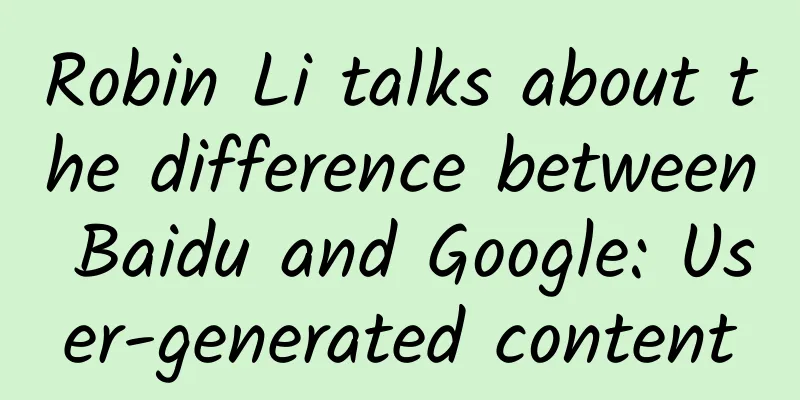Robin Li talks about the difference between Baidu and Google: User-generated content

|
1. Differences between Baidu and Google Question: I would like to ask two questions: First, what are the differences between Baidu and Google in terms of development strategy or specific product strategy? Second, I would like to ask whether 360 and Sogou will have an impact on Baidu? Robin Li: The difference between Baidu and Google can be divided into two stages. In the early PC stage, we mainly did UGC, User Generated Content, which means user-generated content. This is different from the search in the American sense. In the development process, we did not passively index the existing content on the Internet, but created content for Chinese users and Chinese Internet users. For example, Baidu Tieba, the world's largest Chinese community, has nearly 100 million active users every day. Their speeches from December 2003 to the present have been recorded, and these contents can be retrieved by Baidu. Later, Baidu Knows, Baidu Encyclopedia, etc. all have the same concept. We let users create portals and content, and then search through search engine technology. This is the biggest difference between Baidu Search and Google in the development path or thinking in the PC era. In the era of mobile Internet, there are also huge differences between Baidu and Google, even in terms of concepts. Google focuses more on the Android ecosystem, how to make Android create more apps, or how to create industries that they think may become big in 20 years, such as driverless cars or health hardware. They are thinking about this kind of thing. For Baidu, we want to connect not only information, but also services. For example, if you open Baidu and type in "cinema", it will tell you which cinema is 1.1 km away, what movies are playing at what time, which seats are available for purchase, and you can pay after choosing your seat. A series of actions can be completed in Baidu. Google does not do this. In their view, it is not their business. If there is anything on the Internet, I will just index it for you. In our view, Chinese netizens and users, regardless of whether this is Baidu's responsibility or not, only care whether they get what they want here. I also found this concept difficult to accept in the early days. For example, if someone searches for bad content on Baidu and is deceived, this information is not from Baidu. I am just indexing it. My concept at the beginning was: it is not my fault. Later, we gradually realized that if others think it is your fault, it is your fault, and you have to find a way to solve it. So later we made a security plan, which is equivalent to buying insurance. If you are deceived through Baidu search, even if you are not on Baidu's website, we will compensate you if you are deceived. This concept gradually turned around. What is the fact is not important. What is important is what others think. If others think so, you should find a way to solve it. In the era of mobile Internet, we found that when people search Baidu, their main purpose is not to see what movies are playing, but to go to where to watch movies. We try to satisfy their needs. So we hope that users can not only obtain knowledge and information here, but also obtain services, which is more convenient for them. Fortunately, the overall development of China's real economy has not been particularly long, so traditional industries are very open and willing to cooperate with the Internet. This is why we can connect with the IT system of movie theaters. This is the biggest difference between us and Google in the era of mobile Internet. Just now you mentioned that there are also search engine competitors in China. I think this is a good thing. More competitors can help each other learn from each other and force you to improve faster. At present, Baidu has an absolute leading market share in both PC and mobile Internet, and its share in wireless is even higher. In the wireless era, the threshold has become higher. This is because connection services are not simple search engine technology, but must be combined with offline. At the same time, more and more people express their needs through voice and images. Voice recognition is difficult, and image recognition is even more complex and difficult. Baidu is much better than other competitors in these technologies. Therefore, the differentiated experience in these aspects will become more and more obvious in the future. In short, every company has its own different development ideas. We have our own things, so we run forward in our own direction and don’t pay much attention to how others are going. We are more concerned about the degree of satisfaction of user needs. 2. Most concerned about whether the product is recognized by the market Question: You mentioned earlier that it is the Strategic Office that discovers a new future. When you determine that this may be the future, who makes the decision? Robin Li: I definitely make the decisions on major strategies. The Strategy Office is like a staff department. In fact, there is a process of persuasion. I will challenge them as they speak. In theory, the people below should be more sensitive and know more about the changes in the market. They should tell their superiors what we need to do. The process of their speaking is the process of forming a consensus and making judgments. Baidu also has a culture of Enjoy being challenged. Sometimes people understand it as Enjoy challenge Others. No, we don’t encourage you to challenge others, but we encourage others to challenge you. Or, as an individual, I particularly like others to say that I disagree. The more you are challenged, the more perfect your own ideas will be, and the lower the chance of making mistakes will be. The working relationship between the Strategy Office and me is also like this. If he talks to me, I will challenge him, and if I talk to him, he will also challenge me. We will reach a consensus through debate. Question: Let me ask you a question. Which of your strategic decisions are more important, such as scale, confidentiality, or profitability? Which are the basic starting points for your decision-making? In addition, as an Internet company facing great uncertainty every day, do you have to plan your revenue growth rate and structure? How to combine this with finance in your decision-making? Also, do you imagine what role Baidu's revenue from sources other than search will play in Baidu in the future? Robin Li: To be honest, I don't spend much energy on revenue, profit or personnel growth in the next three years. I can't remember how much revenue this year is, and I can't remember how much profit last quarter was. What I care most about is whether our products will be recognized by the market. I can remember how many mobile searches were made yesterday, how many PC searches were made, and what the group purchase turnover was yesterday. These things mean that the market recognizes you. If many people use these things every day, it means that this thing is accepted by the market, so I think about this every day. After a new technology is applied, what kind of impact does the market recognition have? Has the turnover increased? Has the average number of searches per user changed? Has the number of people using voice search changed every day? Has the way they express their needs changed? Once the way changes, has our satisfaction increased or decreased? If it decreases, how can we improve it? This is what I think about every day. I think once something is recognized by the market, you will naturally have revenue, profit, and good growth space. Of course, for me, I know that there are other people in the company, such as the CFO, who are very concerned about the profit of the next quarter. This is what she cares about, and I don't care about it. 3. Why does Baidu want to go international? Question: Robin, I want to ask a question. Baidu is the world's largest Chinese search engine. Why does it want to go global? What do you think about going to countries like Egypt and Brazil? What challenges do you encounter in the process of internationalization? Robin Li: Actually, in my mind, I never thought that Baidu was a company that only served the Chinese market. When Baidu was founded in 2000, the Baidu logo was not what it is now. There was only the left half of the current logo, without the two Chinese characters Baidu. Because at that time, I felt that we were not a company that only served the Chinese market. Although I started with Chinese search, I would definitely be a global company in the future. Later, during the development process, I realized that if I wanted to go global, I had to do well in the Chinese market first. But at that time, Baidu was not well-known, and most people didn't know what the logo was when they saw it, so they had to add the two Chinese characters Baidu. When it came to internationalization, people in most countries didn't know what the two Chinese characters meant, so they felt very entangled. Later, we said that when entering any market, Baidu would keep the two-thirds of the left side, and the right half would be replaced with the local language. I think search technology and the quality of people can be globalized, but search engines developed earlier in the United States, the market is huge, and these companies are also very strong, so it is impossible to enter the US market right away. I initially chose to enter the Japanese market because Japan is the second largest economy and there is no dominant search engine. At that time, Yahoo and Google basically had a 50-50 market share. Consumers are more likely to accept a new brand when brand awareness has not yet been fully established. Later, we began to turn to developing countries, which are more receptive to Chinese brands and whose market development is more like that of China three to five years ago. However, we also found that the international market, especially the market in developing countries, is relatively small and needs to be cultivated, such as the Vietnamese market; but when we see a relatively large market like Brazil, which has a larger population and 80 million mobile phones, we think that we can still make something very interesting after a few years of cultivation, so we are determined to do it. Our technology accumulation includes not only search, but also automatic translation. In countries with small languages, we can at least make it easier for netizens to read English and Chinese documents. So we also have our own unique value, and we can provide better services in those markets. My idea is to be recognized by the market first, start moving in that place first, and then think about how to make money. 4. Baidu CEO's ability should be to judge changes Question: Google once had professional managers, and they were in charge for a long time. Baidu has been under your command for the past 15 years. From an entrepreneur to a company of such a large scale, what have you experienced and learned in this process? Robin Li: This is a very good question. When Baidu was founded, our investors also told me clearly that they hoped to introduce a professional manager to be the CEO. I said no problem. So in the first five years of Baidu, I was not the CEO myself. I was the president. The CEO position was left vacant. When I found someone, I would let him be the CEO. To be honest, I searched for five years but didn’t find one. The process of searching was also a process of gradually understanding the business. When we were going to go public in 2005, the company could not go public without a CEO. So when writing the prospectus, who would be the CEO? I said I would still be the CEO, and from then on I officially became the CEO of Baidu. In fact, I have always felt that if I can find a suitable CEO, I can give up the position immediately, and there will be no problem. Why didn't I find it later? I have also thought about this question. I think it's because our market changes too fast. In a rapidly changing market, what should the best skills of a company leader or CEO be? It's to make judgments about changes. What changes have occurred in user behavior? What dangers and opportunities does the new ecosystem bring to us? These things are not what professional managers are good at. What are typical professional managers good at? You can only manage 500 people, right? I can manage 5,000 or 10,000 people, and he can do this. But for an Internet company, in a business that grows 100% or even 200% every year, it is not enough or even necessary for you to do this. I can't do this, but I think I can lead the company forward. The reason is that for such an industry and company, the requirement for the CEO is mainly to make accurate judgments about the business. If a professional manager retires after 4 years, it won't be that important to him how much profit the company will make after 4 years. As for the mobile transformation I just mentioned, I changed the operating profit margin from 53% to 29% in 2 years. Professional managers don't dare to do this, but founders and entrepreneurs have the courage to do it, which is why I have been the CEO for so many years. But my mindset is still open. Whenever I can find someone to take this position, I will be happy to give up the position. Question: Baidu has always had some cooperation with real estate, including Baidu Leju and investment in Anjuke. Would you mind telling us how the cooperation between Baidu and real estate is positioned? And how the open ideas and platforms of Baidu mentioned just now are reflected in real estate? Robin Li: Real estate is a very large market, and there are many ways to cooperate. One type is to cooperate with real estate websites. This kind of cooperation is the easiest for us, because they are already an Internet company, and their thinking is Internet thinking. We don't need to teach them. In most cases, they take the initiative to come to us and say, "I need to buy so much traffic from you, how can you guide more customers to me?" They only ask us to find a way in this regard. But when cooperating with real developers, we need to learn more about their real needs, and then see how our things can be connected with them. Baidu is completely open, completely based on the customer's own preferences and their understanding of the market. For each vertical industry, I am not the one who understands it best. People in the vertical industry understand these things best. We are just a cooperative angle. |
<<: Steve Jobs' 60th birthday: 14 quotes to ponder
>>: Forward SMS to a specified mobile number by keyword
Recommend
Question: Who stole my cell phone signal?
As a communications engineer, I am often asked th...
How to write product titles for Kuaishou stores? What are the things to pay attention to?
This article mainly introduces how to write produ...
Women really need to eat more meat! The benefits are more than just a little bit!
When it comes to eating meat, some female friends...
The Spring Festival Gala of the Song Dynasty
Did the Song Dynasty also have a "Spring Fes...
Product operation: How to truly operate and promote APP for free?
In the process of dividing up channel resources a...
How does Bilibili operate and market? 8 tips!
Today I’m going to share with you some of Bilibil...
From a global perspective, here are 4 tips to help you improve product activity
For all our promotions , we must identify the tar...
Electric Technology Car News: A 90,000 yuan high-value showdown between the new Emgrand and Arrizo Sport
As the founding fathers of independent brands, Ge...
Can you drink overnight or boiled water? Many people don’t expect the consequences!
Information source: "Tencent Medical Diction...
How to make money by creating content? 3 profit models for vertical community operations!
Three profit models of vertical communities: cont...
Analysis of “Hua Xizi”’s hot-selling product strategy!
What I am disassembling today is not a specific o...
Apple's decline
"Is there any signal?" two Apple users ...
How can we operate a Baidu bidding account well?
For many people who do Baidu bidding promotion, h...
How KOLs earn millions by selling courses (Part 1)
The online education industry has become a hot sp...
NIO APP traffic diversion strategy!
Today we disassembled the traffic strategy and re...









